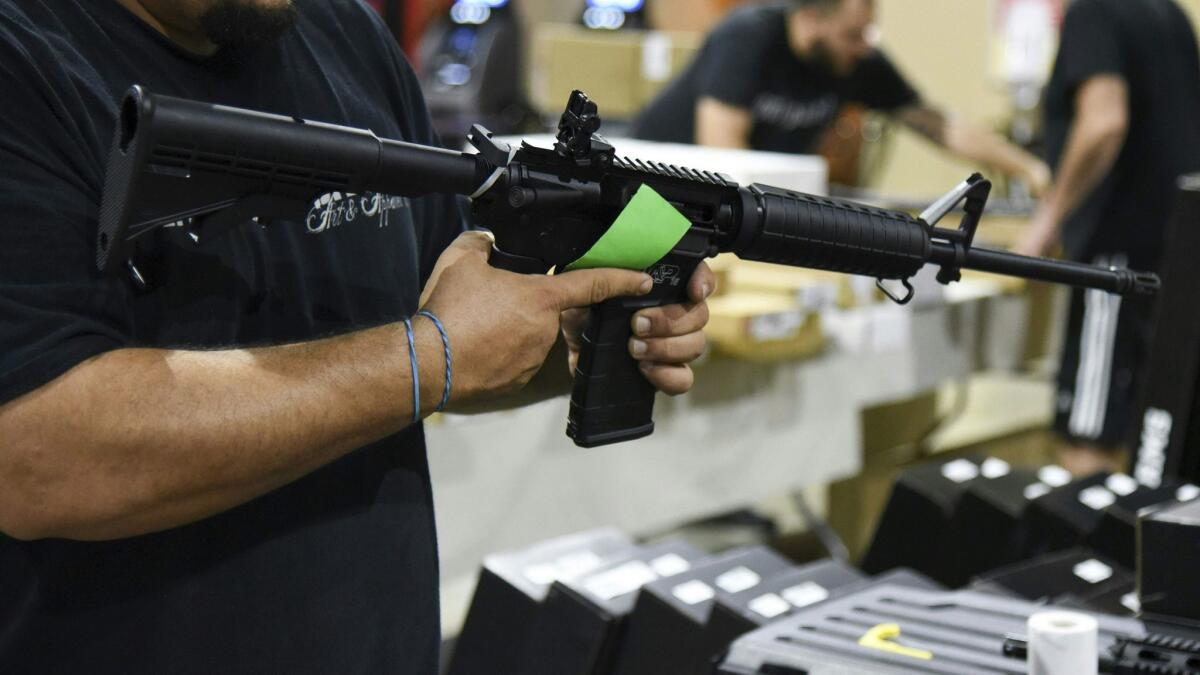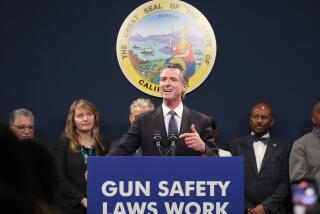Since Parkland school shooting, gun control debate spreads to state capitols

- Share via
Reporting from Olympia, Wash. — In the aftermath of the Parkland mass shooting, gun control advocates have held out hope that this tragedy would provide the impetus for action that past massacres have not.
So far, most of the attention has been focused on Congress and the Florida Legislature. But debates have been raging in statehouses around the country in the last week on measures to make it harder to obtain assault weapons and easier for authorities to seize them.
“I have no doubt that the measure you’re discussing today is likely to sail through,” William Burris, a retired detective representing gun owners, testified before a state Senate committee in Olympia, Wash., this week. “But don’t lose sight of the fact that ultimately on-site security is the best chance of minimizing these types of events.”
The Washington measure, similar to many being considered nationwide, would raise the age limit and establish a 10-day waiting period for those purchasing a semi-automatic weapon.
“Raising the age limit to purchase semiautomatic rifles is consistent with what we now know about brain development,” said Thomas Duhamel, a pediatric psychologist arguing in favor of the bill. “Teenage brains are different from adult brains,” and, if a student is armed it is the likely result of a solitary, impulsive reaction.
In a statement, the National Rifle Assn. said that Washington’s Senate Bill 6620 is merely another of the “gun control measures that only serve to punish law-abiding citizens.”
Washington state was among the places where activists were galvanized by the shooting at Marjory Stoneman Douglas High School in Parkland, Fla., where 17 people died when a former student opened fire with an AR-15 assault weapon on Feb. 14.
As in other states, frustration and emotional testimony took up much of the hearing time in Olympia. Speakers included relatives of slain students and other victims of gun violence.
Paul Kramer, whose son was badly wounded in a 2016 shooting by a love-sick teen gunman who killed three former students at a party in a Seattle suburb, called the shooter “an angry, jealous young man with an easily acquired AR-15,” bought legally. “Were this proposed bill in effect as law two years ago, the shooting wouldn’t have happened as it did,” Kramer said, and maybe not at all.
Jim Parsons, whose daughter Carrie was among the 58 killed in Las Vegas last year by a sniper using a modified AR-15, said, “There is no place is society for these weapons of mass destruction.” The Vegas gunman’s weapon was effectively turned into a machine gun with a bump stock, which some states, including Washington just this week, have banned.
As gun debate roils on, teachers in this Texas school are already armed »
In addition to the measure in Washington, at least a dozen states are weighing what are known as red flag laws allowing authorities to seize the guns of those found by a court to be a danger to family and others. Five states — California, Oregon, Washington, Connecticut and Indiana — already have some form of the law. Rhode Island last week made it six with an executive order by Gov. Gina Raimondo.
Florida is among the states considering a red flag law after the Parkland shooting motivated students, parents and others to demand action. Republican Gov. Rick Scott has also proposed raising the semiautomatic rifle ownership age to 21.
Arming teachers is also up for debate.
After the 2012 shootings at an elementary school in Sandy Hook, Conn., at least five states (Kansas, South Dakota, Georgia, Texas and Tennessee) passed laws to allow teachers to carry, according to the National Conference of State Legislators. Two dozen other states have laws that can be used to justify arming school staffs.
ALSO
Trump urges lawmakers to pass ‘comprehensive’ gun law and stand up to gun lobby
Dick’s Sporting Goods, Walmart restrict their gun sales, citing school shooting
Delta tried to find a middle ground on gun control — only to discover there wasn’t one
Anderson is a special correspondent.
More to Read
Sign up for Essential California
The most important California stories and recommendations in your inbox every morning.
You may occasionally receive promotional content from the Los Angeles Times.












